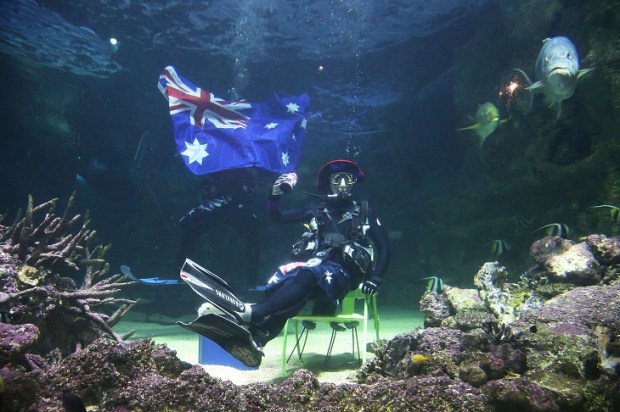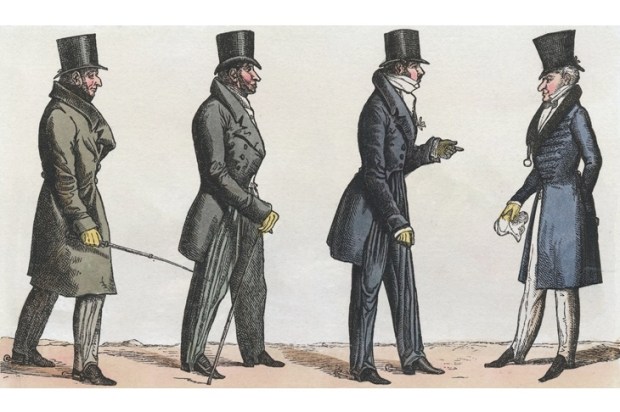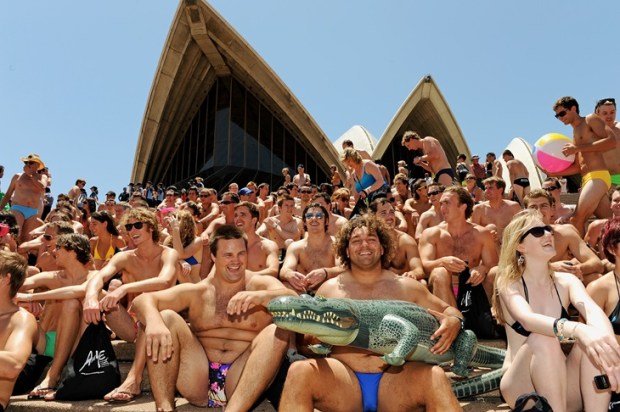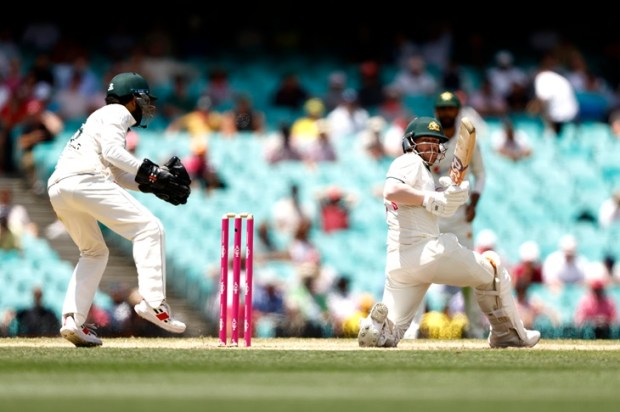It takes a special kind of agility to shoot oneself in the foot while being hoisted by your own petard, but that seems the only way to describe the communications disaster that is the ‘Yes’ campaign for the Voice to Parliament. Apart from being unclear about how the whole thing is going to work, people are not even clear on the word processor page count of the Uluru Statement from the Heart.
And it’s hard to accuse the opposition of deliberate misinformation when the Prime Minister insists it is one page, while key architect Megan Davis’ documentation states: ‘The Uluru Statement from the Heart isn’t just the first one-page statement; it’s actually a very lengthy document of about 18 to 20 pages.’ Pardon us for being a tad confused.
But the troubles go deeper than that. It’s even harder for the post-modern left to accuse anyone of lies and misinformation when they’ve spent the better part of 40 years marching through our tertiary institutions arguing there is no truth. Only power. Hegemony, patriarchy, colonialism, capitalism – it’s all just oppressor and oppressed, and truth be damned.
I was fortunate enough to squeeze out my Arts degree in the late 80s just before the cultural Marxists began their Long March. I studied anthropology when it was an academic endeavour rather than an activist rally. We read ethnographies and studied the societies, kinship systems, rituals, taboos, totems, and so on, of various cultural groups, including Australian Aboriginal people. (NB. The word Aboriginal is no longer deemed politically correct because it means ‘first peoples’; the correct term now is First Peoples. Perhaps it’s the capitalisation that makes all the difference.) It was challenging, enlightening, and often confronting. I was forced to withhold my values and objectively look at other societies and write comparative accounts. (It would have been nice to write a one-page essay and claim it was 26 to meet the required word count, but alas I had to use the standard undergraduate strategy of inserting more and longer quotations from my primary sources. The ‘Yes’ campaigners have bizarrely taken the opposite approach and claimed their lengthy paper is only one page long.)
Somewhere along the line, however, the idea of seeking the truth in the humanities was replaced by the self-undermining strategy of trying to logically argue there wasn’t any truth, the fundamental problem with this being that, to do it, the post-modernists relied on the same language that constitutes our shared understanding of reality to try to make any sense at all. You may be having some difficulty understanding me because of the quality of my writing, but I’m pretty certain you’re following me to some degree because you understand words like ‘understand’ and ‘degree’. There simply cannot be any meaningful communication or adequate functioning in the world, if there is not some truth grounded in reality, even if philosophically we can find paradoxes that make things hard to pin down. Whenever someone argues with me that there is no objective truth, I invite them to kick a brick wall in bare feet to prove it’s only subjective. I haven’t had any takers so far.
It is tempting for ‘No’ campaigners like myself to play the left at their own game and deliberately muddy the waters around the Voice to Parliament. After all, we can’t be wrong. There is no such thing as misinformation, only perspective, my truth. It’s only about power, so let’s do whatever it takes to win. All is fair in love and culture war. But that would be to fall down the same rabbit hole and risk going as mad as the hatters on the other side.
It is the goal of the scholar to come closer to discovering and presenting the truth. That is why planes fly, bridges stay up, and some methods of cracking an egg work better than others. But, oddly, now it’s the cultural left who, in a change of heart and without any apparent cognitive dissonance, are suddenly demanding something called ‘Truth Telling’. Huh? Inside every relativist is a fundamentalist waiting to be unleashed. Except their version of ‘truth’ is clearly not characterised by being the whole truth and nothing but the truth. It is selective, which is what makes it activism rather than scholarship.
The 80-plus pages (let’s leave a margin for error) of recorded dialogue of the meetings of the referendum council in the leadup to the Uluru Statement from the Heart (estimated at one to 26 pages) is replete with talk of genocide, massacres, theft, abuse, and stolen children, but is absolutely silent on advancements in human life, or what life was like for the reported 60,000 years prior to English settlement. No murder? No tribal warfare? No abuse? Just a happy, harmonious dreamland?
Well, not so if one is prepared to read the actual ethnographies and accounts of anthropologists, who had no motive to misrepresent what they saw when they conducted their field studies in virtually untouched traditional societies. In many cases, survival in subsistence conditions required the killing of the elderly, the weak, and infants on a large scale, translating to an astonishing number of murders over the 60,000 years of ‘continuous living culture’. Yes, let’s talk about crimes against humanity! Especially if you want to go over the head of national sovereignty and appeal to the United Nations. What is the statute of limitations? Then there are the accounts of the violent and incestuous gang rapes of young women that will make your blood curdle, but you won’t hear much from feminists. It’s nothing compared to the microaggressions of white men mansplaining how to drive a manual car.
People may argue that what happened before 1788 is not relevant, as we are talking about what happened after the ‘invasion’ and the tragic consequences of the impact of modernised European culture on traditional ways of life. But the talk of reconciliation and reparations, apart from the plunging of spears into thighs, is all represented in modern terms. Suddenly the traditional hippy rejection of modern capitalist measures of wellbeing – GDP, income, economic growth, life expectancy, and so on – is reneged when it comes to ‘closing the gap’.
Again, the activists have no concern for truth, only for grabbing whatever ideological weapons of convenience are at hand, however inconsistent, to make their ambit claims. Maybe the ‘happiness index’ of the Pitjantjatjara people was higher 40,000 years ago than ours is today. Happiness and wellbeing can be found in however one chooses to live, and contrary to popular misconception, good economists don’t push growth for the sake of it. Disconnect from the grid if you wish, just don’t complain about not being able to pick up Netflix. Skip the Western medicine, but don’t demand the same life expectancy.
All the minerals and resources of this great continent had almost zero economic value prior to Westernised development, because there was no one putting them to any use, turning them into something of economic value and creating wealth. There was no money. If we want to talk about closing the gap, how about a more qualified economist than myself calculates what the average income was for First Peoples 253 years ago, in terms of purchasing capacity for goods and services today? What was healthcare like, life expectancy, and so on? I would hazard a guess there would be a far greater ‘gap’ between then and now. Quickly activist claims of an unjust deficit, and demands for a flat percentage of GDP, become grossly exaggerated and unwarranted. In order to have a GDP, someone has to produce it.
The tragedy, really, is that all the benefits of modern society are as readily available to Indigenous people as they are to anyone. ‘Gaps’ exist anywhere one cares to look, but this one particular gap exists primarily because of the limbo between traditional and modern worlds in which many, particularly regional and young, Indigenous people live.
One physician and psychiatrist has talked in similar terms about the entrenched poverty in some northern English towns. It is not just about the money. The poor in the housing slums in England are locked into a multi-generational cycle of violence, squalor, and addiction, that is a kind of spiritual death, while being spoon-fed the kind of ideological language and policies that do just enough to keep them on life support, without changing the values that might lead to a better life.
And therein lies the seed of the communications disaster that is The Voice campaign. Far from being progressive, it reinforces the walls of that limbo in which so many are trapped. As some have said, it is not so much the lack of material wealth that is the problem, unless one is obsessed with relativity and grievance, as the purgatory that they – particularly the young – inhabit between tradition and modernity.
The Voice is being pushed into a space between romanticised past and modern reality, and that is not a good place from which to move forward. Indeed, many Indigenous people may not really want to, preferring to lead traditional lives. Although made up of hundreds of different tribal cultures, if ‘First Nations’ people remained unchanged for 60,000 years, collectively they were the most conservative people ever on earth. If they wish to close the gap, they must embrace ideas of genuinely progressive modernity. If they wish to inhabit a separatist political domain, they must relinquish some ideas of entitled equality. The government is pushing the lie of First Peoples having their cake and eating it too, which is why their communications have been an undigestible blancmange.

























